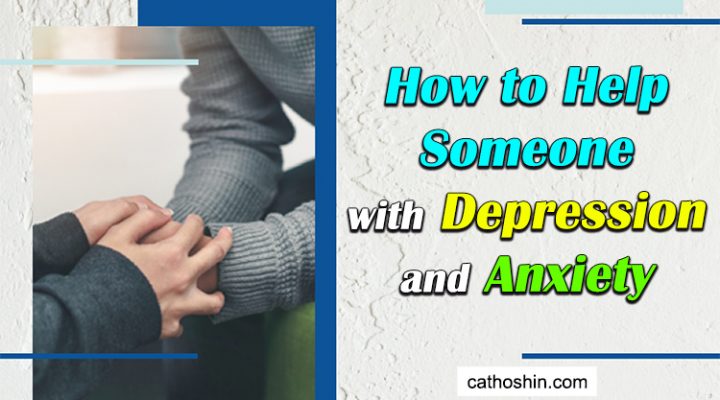How to Help Someone with Depression and Anxiety in 5 Ways?
Someone you know is struggling with depression and anxiety?
If people around you (e.g., your loved ones) are having depression or any kind of anxiety, the first thing is to reach out to them. But then, you may wonder how you can help them particularly. The feeling of you unable to do anything when seeing them suffering can make you frustrated, disappointed, angry, and helpless.
In today’s article, let’s discuss how to help someone with depression and anxiety.
Firstly, knowing the signs of depression is the starting point to provide them the right treatment.
Table of Contents
10 Signs of Depression and Anxiety to Look out for…

Being unhappy isn’t the same as being depressed. Keep in mind that those with depression and anxiety have a completely different mindset from individuals who are feeling down. To determine whether what your loved ones are suffering from is sadness or depression, have a look at the following signs.
When you feel sad or upset, it only lasts for a short time; however, depression is persistent.
- Feeling irritated, frustrated, or angry over small things
- Having anxiety, agitation, or restlessness
- Having changes in appetite
- Sleeping much more or less than normal
- Often expressing feelings of sadness, hopelessness, or emptiness
- Having feelings of guilt or worthlessness
- Ruminating on past failures
- Having a hard time on thinking, concentrating, remembering things, and making decisions
- Suffering from unexplained physical problems
- Thinking about death or suicide
See also: 7 mantras to say when smudging yourself
5 Ways to Help Depressed People
Here are a few ideas that you can make use of to take care of someone with depression and anxiety:
1. Be supportive
Depressed people don’t need you to come up with big surprises or anything else; in fact, all they need is your presence. The most helpful thing that you can help someone with depression and anxiety is to be by their side. Sit next to them and lend them your ears as well as your shoulder. Let them cry on and lean on until they feel comfortable. Always be patient and tell them that you are always there for them.
When you feel that they’ve gradually opened up to you, it’s a good idea to share your knowledge about depression. Most importantly, let them know that it’s not their fault for being depressed. Keep repeating that they are not worthless, useless, or hopeless like how they about themselves.
2. Mention your concerns
If you want to bring up your concerns with a person having depression, make sure to share it in a nonjudgmental way. Don’t bombard them with questions and advice; instead, give them a moment to share about their inner feelings.
Listening is a key to great communication and also an essential part of helping someone with depression and anxiety. How to get them talking about this issue? Let’s start with all the changes from them that you’ve observed recently. Be neutral when saying this, not critical! You need to pause a couple of times so that they can respond to the things you say.
Tell them that you’re worried about them.
But, avoid saying something like, “Look at A, she has so many problems but nothing can drag her down,” “There are still plenty of good things in this life, don’t feel so sad.” These are harmful advice – why? Depressed people believe that they should be strong mentally. That thought stops them from seeking others’ help!
3. Avoid judgment and blame
When they stop doing things they used to do before including housework, don’t quickly conclude that they are lazy.
It’s not that they don’t want to do. If you’re about to feel frustrated and say anything to blame them, pause for a moment and remind yourself that people with depression and anxiety are not lazy, indeed they’re ill.
Daily activities like cleaning the house, cooking, or feeding pets are overwhelming to someone who is depressed. Due to this, all the responsibilities around the house now will pass on you. Rather than judging or blaming your loved one (which surely makes their condition worse), it’s much better to ask for help from others.
Also, don’t put the blame on yourself!
4. Give them unconditional love
People with depression and anxiety often feel guilty. Though we tell them that being depressed is not their fault, they can’t help thinking they are a burden to you as well as those around them. As days pass by, the thought that your life would be much better without them will come to their mind and affect them more.
How to clear off those negative feelings?
The answer is to show up next to them regularly and let them know that your love for them is unconditional. Reassure your loved one that you feel angry and disappointed with their illness, not them.
Try your best to care and love someone with depression and anxiety; aside from that, you should also take good care of yourself. Stay healthy and strong so that you can support your loved one physically and mentally.
5. Understand medications
Some depressed patients do take medication. In order to help them practically, let’s start with learning about how the medication works, what the side effects are, what signs to look for if the treatment is not working, and when your loved one should stop taking a medication.
At home, you can be in charge of keeping their pills organized, refilling prescriptions, and reminding them to take their medication every day.
In Conclusion
That’s all for how to help someone with depression and anxiety!
This seems to be a huge task as depression is a complex issue. But the best things you can do to them are the simplest: Be a good listener, reach out to them by all means, be open about depression, and tell them they can come to you anytime they want to.
Most significantly, give them your support and unconditional love. Whether it’s a good day or bad day, stick with them as always. Shower them with encouragement whenever they feel hopeless and tell them how wonderful they are.





Leave a Reply